The Extent of Visionary Individuals Shaping Humanitarian Action
VerifiedAdded on 2020/01/07
|13
|4482
|208
Essay
AI Summary
This essay delves into the profound influence of visionary individuals on the trajectory of humanitarian action, examining how figures like Mother Teresa, Nelson Mandela, and Martin Luther King have shaped its principles and practices. It begins by establishing the historical context of humanitarianism, highlighting the evolution of its core tenets such as humanity, impartiality, neutrality, and independence. The essay then analyzes the contributions of these visionary leaders, showcasing their dedication to serving the underprivileged, fighting for justice, and promoting peace through non-violent means. Mother Teresa's work with the Missionaries of Charity, Nelson Mandela's fight against apartheid, and Martin Luther King's civil rights activism are presented as pivotal examples of how individuals can drive significant change in humanitarian efforts. The essay underscores the importance of these leaders' actions in establishing a global framework for humanitarian aid and fostering a more compassionate world. It also discusses the awards and recognition they received for their work. By exploring their lives, the essay illustrates the enduring impact of visionary individuals on the history of humanitarian action.

Historical - “Discuss the extent to which visionary individuals have shaped the history of
humanitarian action.”
Questions
humanitarian action.”
Questions
Paraphrase This Document
Need a fresh take? Get an instant paraphrase of this document with our AI Paraphraser
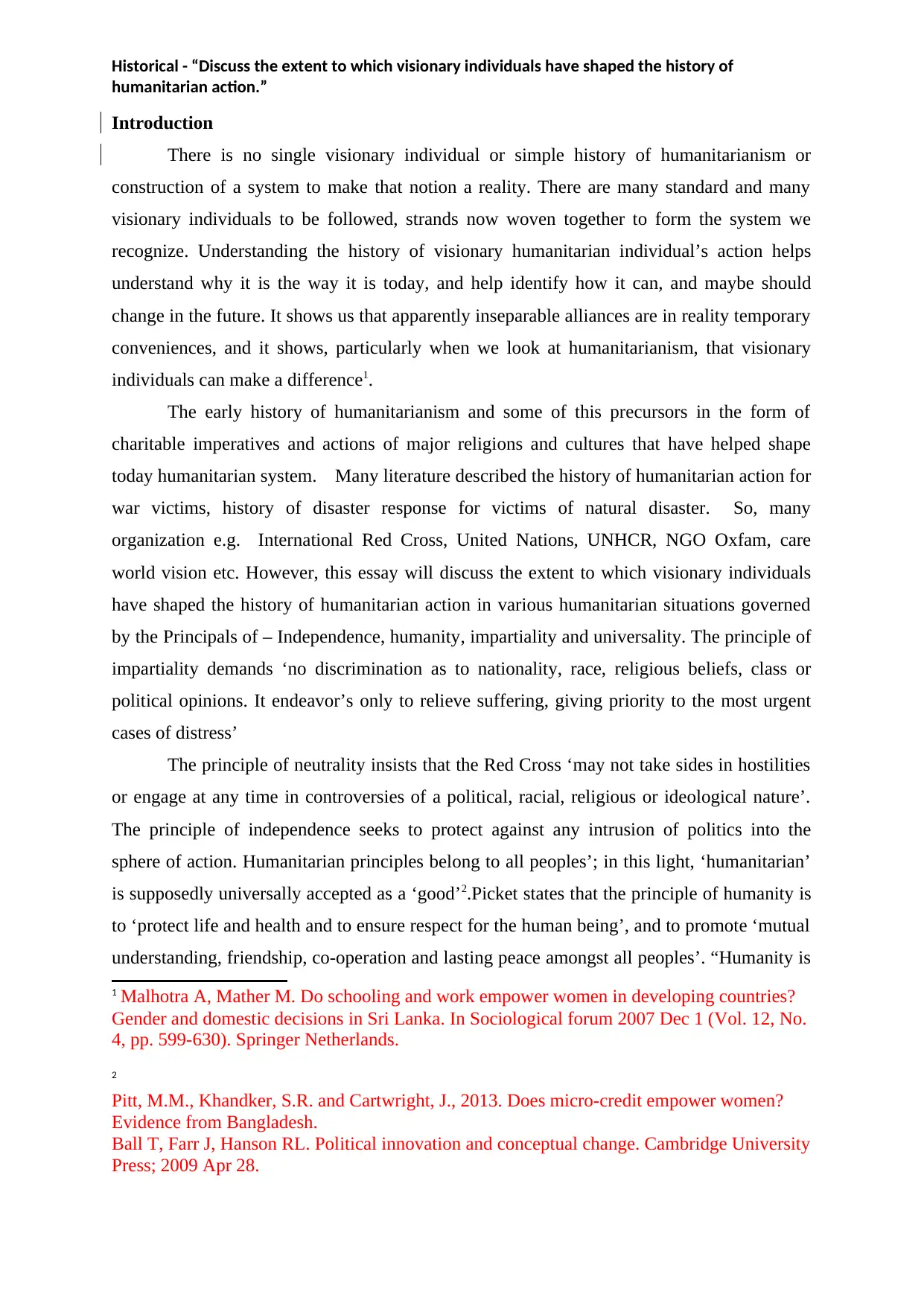
Historical - “Discuss the extent to which visionary individuals have shaped the history of
humanitarian action.”
Introduction
There is no single visionary individual or simple history of humanitarianism or
construction of a system to make that notion a reality. There are many standard and many
visionary individuals to be followed, strands now woven together to form the system we
recognize. Understanding the history of visionary humanitarian individual’s action helps
understand why it is the way it is today, and help identify how it can, and maybe should
change in the future. It shows us that apparently inseparable alliances are in reality temporary
conveniences, and it shows, particularly when we look at humanitarianism, that visionary
individuals can make a difference1.
The early history of humanitarianism and some of this precursors in the form of
charitable imperatives and actions of major religions and cultures that have helped shape
today humanitarian system. Many literature described the history of humanitarian action for
war victims, history of disaster response for victims of natural disaster. So, many
organization e.g. International Red Cross, United Nations, UNHCR, NGO Oxfam, care
world vision etc. However, this essay will discuss the extent to which visionary individuals
have shaped the history of humanitarian action in various humanitarian situations governed
by the Principals of – Independence, humanity, impartiality and universality. The principle of
impartiality demands ‘no discrimination as to nationality, race, religious beliefs, class or
political opinions. It endeavor’s only to relieve suffering, giving priority to the most urgent
cases of distress’
The principle of neutrality insists that the Red Cross ‘may not take sides in hostilities
or engage at any time in controversies of a political, racial, religious or ideological nature’.
The principle of independence seeks to protect against any intrusion of politics into the
sphere of action. Humanitarian principles belong to all peoples’; in this light, ‘humanitarian’
is supposedly universally accepted as a ‘good’2.Picket states that the principle of humanity is
to ‘protect life and health and to ensure respect for the human being’, and to promote ‘mutual
understanding, friendship, co-operation and lasting peace amongst all peoples’. “Humanity is
1 Malhotra A, Mather M. Do schooling and work empower women in developing countries?
Gender and domestic decisions in Sri Lanka. In Sociological forum 2007 Dec 1 (Vol. 12, No.
4, pp. 599-630). Springer Netherlands.
2
Pitt, M.M., Khandker, S.R. and Cartwright, J., 2013. Does micro-credit empower women?
Evidence from Bangladesh.
Ball T, Farr J, Hanson RL. Political innovation and conceptual change. Cambridge University
Press; 2009 Apr 28.
humanitarian action.”
Introduction
There is no single visionary individual or simple history of humanitarianism or
construction of a system to make that notion a reality. There are many standard and many
visionary individuals to be followed, strands now woven together to form the system we
recognize. Understanding the history of visionary humanitarian individual’s action helps
understand why it is the way it is today, and help identify how it can, and maybe should
change in the future. It shows us that apparently inseparable alliances are in reality temporary
conveniences, and it shows, particularly when we look at humanitarianism, that visionary
individuals can make a difference1.
The early history of humanitarianism and some of this precursors in the form of
charitable imperatives and actions of major religions and cultures that have helped shape
today humanitarian system. Many literature described the history of humanitarian action for
war victims, history of disaster response for victims of natural disaster. So, many
organization e.g. International Red Cross, United Nations, UNHCR, NGO Oxfam, care
world vision etc. However, this essay will discuss the extent to which visionary individuals
have shaped the history of humanitarian action in various humanitarian situations governed
by the Principals of – Independence, humanity, impartiality and universality. The principle of
impartiality demands ‘no discrimination as to nationality, race, religious beliefs, class or
political opinions. It endeavor’s only to relieve suffering, giving priority to the most urgent
cases of distress’
The principle of neutrality insists that the Red Cross ‘may not take sides in hostilities
or engage at any time in controversies of a political, racial, religious or ideological nature’.
The principle of independence seeks to protect against any intrusion of politics into the
sphere of action. Humanitarian principles belong to all peoples’; in this light, ‘humanitarian’
is supposedly universally accepted as a ‘good’2.Picket states that the principle of humanity is
to ‘protect life and health and to ensure respect for the human being’, and to promote ‘mutual
understanding, friendship, co-operation and lasting peace amongst all peoples’. “Humanity is
1 Malhotra A, Mather M. Do schooling and work empower women in developing countries?
Gender and domestic decisions in Sri Lanka. In Sociological forum 2007 Dec 1 (Vol. 12, No.
4, pp. 599-630). Springer Netherlands.
2
Pitt, M.M., Khandker, S.R. and Cartwright, J., 2013. Does micro-credit empower women?
Evidence from Bangladesh.
Ball T, Farr J, Hanson RL. Political innovation and conceptual change. Cambridge University
Press; 2009 Apr 28.
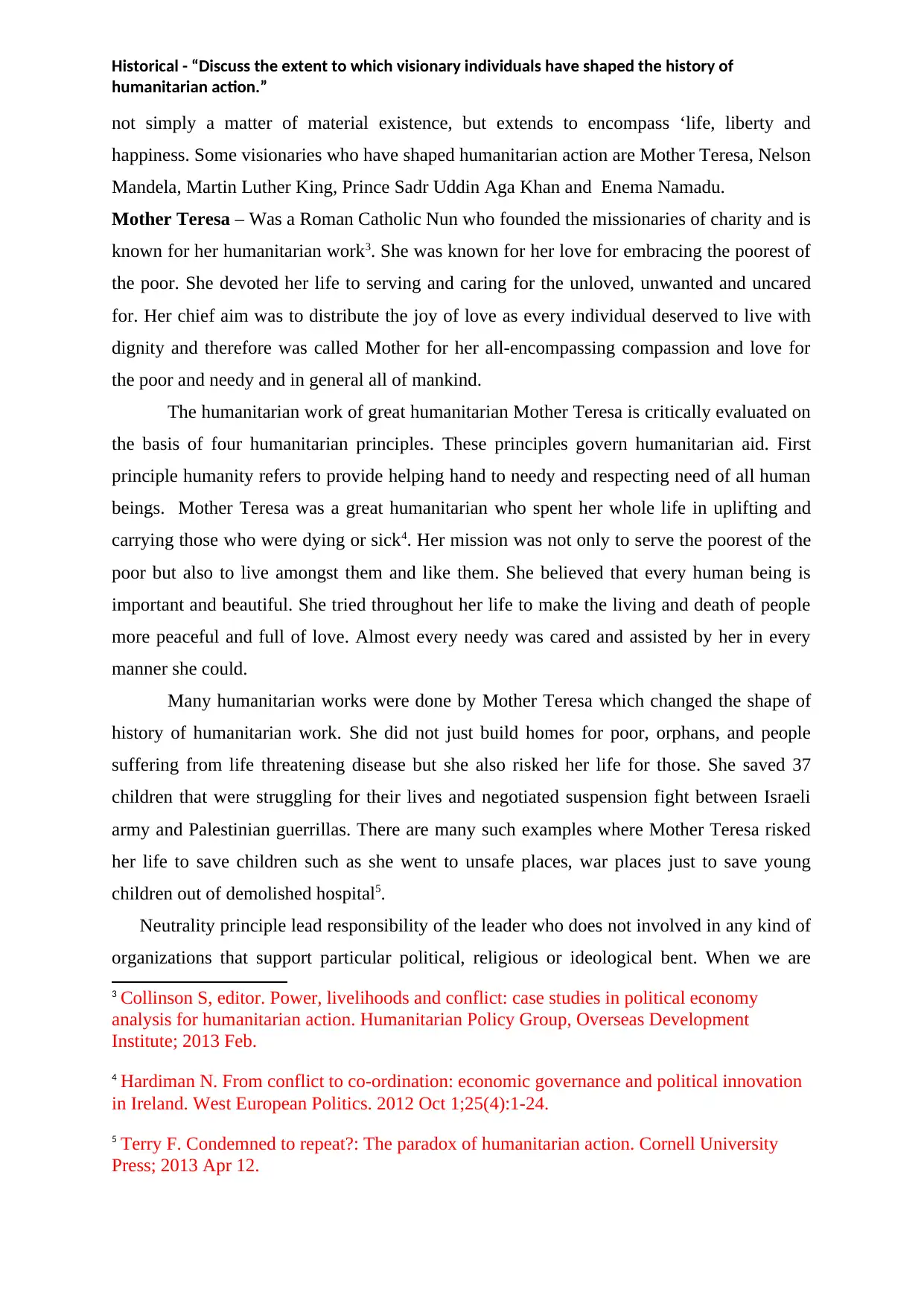
Historical - “Discuss the extent to which visionary individuals have shaped the history of
humanitarian action.”
not simply a matter of material existence, but extends to encompass ‘life, liberty and
happiness. Some visionaries who have shaped humanitarian action are Mother Teresa, Nelson
Mandela, Martin Luther King, Prince Sadr Uddin Aga Khan and Enema Namadu.
Mother Teresa – Was a Roman Catholic Nun who founded the missionaries of charity and is
known for her humanitarian work3. She was known for her love for embracing the poorest of
the poor. She devoted her life to serving and caring for the unloved, unwanted and uncared
for. Her chief aim was to distribute the joy of love as every individual deserved to live with
dignity and therefore was called Mother for her all-encompassing compassion and love for
the poor and needy and in general all of mankind.
The humanitarian work of great humanitarian Mother Teresa is critically evaluated on
the basis of four humanitarian principles. These principles govern humanitarian aid. First
principle humanity refers to provide helping hand to needy and respecting need of all human
beings. Mother Teresa was a great humanitarian who spent her whole life in uplifting and
carrying those who were dying or sick4. Her mission was not only to serve the poorest of the
poor but also to live amongst them and like them. She believed that every human being is
important and beautiful. She tried throughout her life to make the living and death of people
more peaceful and full of love. Almost every needy was cared and assisted by her in every
manner she could.
Many humanitarian works were done by Mother Teresa which changed the shape of
history of humanitarian work. She did not just build homes for poor, orphans, and people
suffering from life threatening disease but she also risked her life for those. She saved 37
children that were struggling for their lives and negotiated suspension fight between Israeli
army and Palestinian guerrillas. There are many such examples where Mother Teresa risked
her life to save children such as she went to unsafe places, war places just to save young
children out of demolished hospital5.
Neutrality principle lead responsibility of the leader who does not involved in any kind of
organizations that support particular political, religious or ideological bent. When we are
3 Collinson S, editor. Power, livelihoods and conflict: case studies in political economy
analysis for humanitarian action. Humanitarian Policy Group, Overseas Development
Institute; 2013 Feb.
4 Hardiman N. From conflict to co-ordination: economic governance and political innovation
in Ireland. West European Politics. 2012 Oct 1;25(4):1-24.
5 Terry F. Condemned to repeat?: The paradox of humanitarian action. Cornell University
Press; 2013 Apr 12.
humanitarian action.”
not simply a matter of material existence, but extends to encompass ‘life, liberty and
happiness. Some visionaries who have shaped humanitarian action are Mother Teresa, Nelson
Mandela, Martin Luther King, Prince Sadr Uddin Aga Khan and Enema Namadu.
Mother Teresa – Was a Roman Catholic Nun who founded the missionaries of charity and is
known for her humanitarian work3. She was known for her love for embracing the poorest of
the poor. She devoted her life to serving and caring for the unloved, unwanted and uncared
for. Her chief aim was to distribute the joy of love as every individual deserved to live with
dignity and therefore was called Mother for her all-encompassing compassion and love for
the poor and needy and in general all of mankind.
The humanitarian work of great humanitarian Mother Teresa is critically evaluated on
the basis of four humanitarian principles. These principles govern humanitarian aid. First
principle humanity refers to provide helping hand to needy and respecting need of all human
beings. Mother Teresa was a great humanitarian who spent her whole life in uplifting and
carrying those who were dying or sick4. Her mission was not only to serve the poorest of the
poor but also to live amongst them and like them. She believed that every human being is
important and beautiful. She tried throughout her life to make the living and death of people
more peaceful and full of love. Almost every needy was cared and assisted by her in every
manner she could.
Many humanitarian works were done by Mother Teresa which changed the shape of
history of humanitarian work. She did not just build homes for poor, orphans, and people
suffering from life threatening disease but she also risked her life for those. She saved 37
children that were struggling for their lives and negotiated suspension fight between Israeli
army and Palestinian guerrillas. There are many such examples where Mother Teresa risked
her life to save children such as she went to unsafe places, war places just to save young
children out of demolished hospital5.
Neutrality principle lead responsibility of the leader who does not involved in any kind of
organizations that support particular political, religious or ideological bent. When we are
3 Collinson S, editor. Power, livelihoods and conflict: case studies in political economy
analysis for humanitarian action. Humanitarian Policy Group, Overseas Development
Institute; 2013 Feb.
4 Hardiman N. From conflict to co-ordination: economic governance and political innovation
in Ireland. West European Politics. 2012 Oct 1;25(4):1-24.
5 Terry F. Condemned to repeat?: The paradox of humanitarian action. Cornell University
Press; 2013 Apr 12.
⊘ This is a preview!⊘
Do you want full access?
Subscribe today to unlock all pages.

Trusted by 1+ million students worldwide
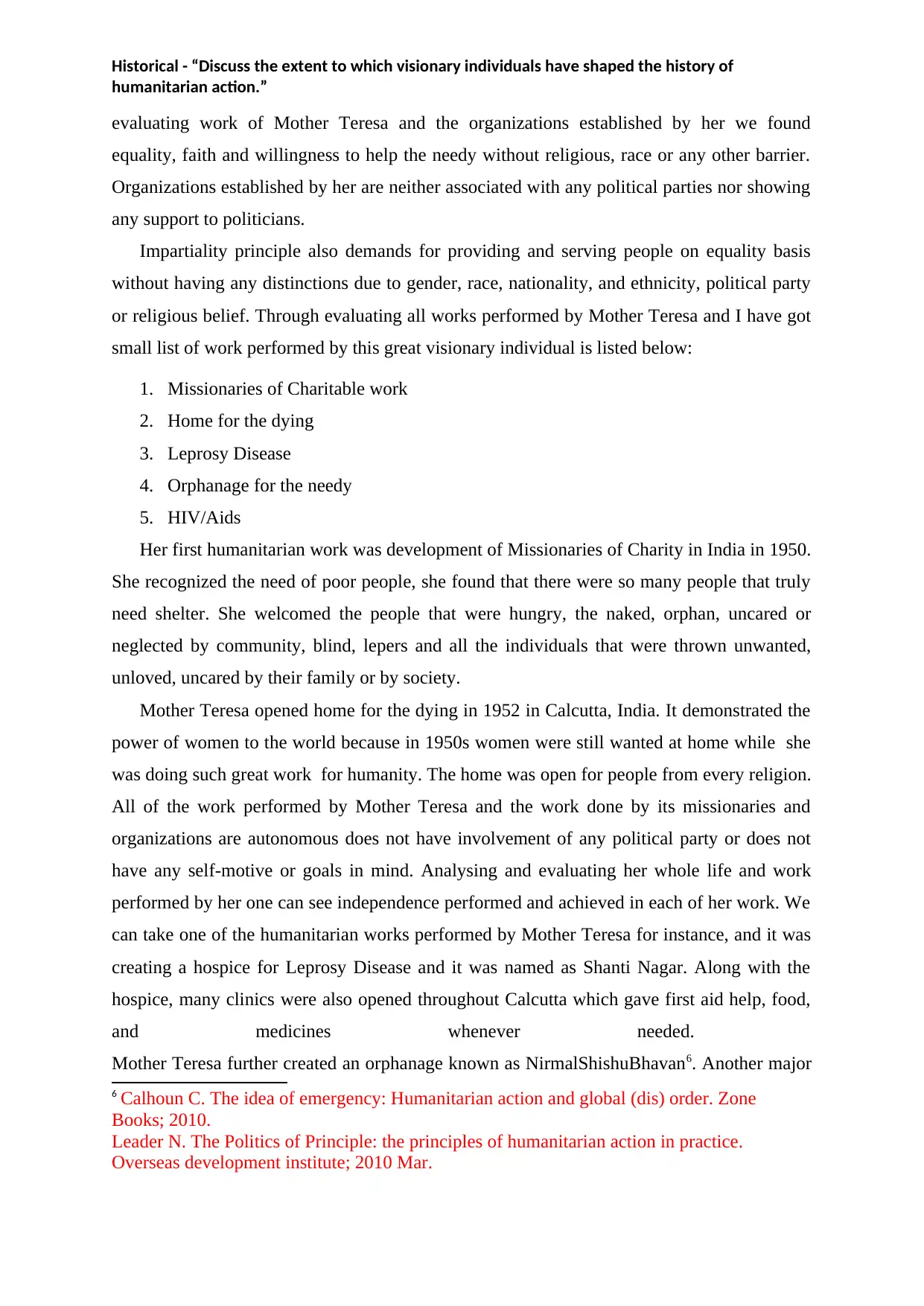
Historical - “Discuss the extent to which visionary individuals have shaped the history of
humanitarian action.”
evaluating work of Mother Teresa and the organizations established by her we found
equality, faith and willingness to help the needy without religious, race or any other barrier.
Organizations established by her are neither associated with any political parties nor showing
any support to politicians.
Impartiality principle also demands for providing and serving people on equality basis
without having any distinctions due to gender, race, nationality, and ethnicity, political party
or religious belief. Through evaluating all works performed by Mother Teresa and I have got
small list of work performed by this great visionary individual is listed below:
1. Missionaries of Charitable work
2. Home for the dying
3. Leprosy Disease
4. Orphanage for the needy
5. HIV/Aids
Her first humanitarian work was development of Missionaries of Charity in India in 1950.
She recognized the need of poor people, she found that there were so many people that truly
need shelter. She welcomed the people that were hungry, the naked, orphan, uncared or
neglected by community, blind, lepers and all the individuals that were thrown unwanted,
unloved, uncared by their family or by society.
Mother Teresa opened home for the dying in 1952 in Calcutta, India. It demonstrated the
power of women to the world because in 1950s women were still wanted at home while she
was doing such great work for humanity. The home was open for people from every religion.
All of the work performed by Mother Teresa and the work done by its missionaries and
organizations are autonomous does not have involvement of any political party or does not
have any self-motive or goals in mind. Analysing and evaluating her whole life and work
performed by her one can see independence performed and achieved in each of her work. We
can take one of the humanitarian works performed by Mother Teresa for instance, and it was
creating a hospice for Leprosy Disease and it was named as Shanti Nagar. Along with the
hospice, many clinics were also opened throughout Calcutta which gave first aid help, food,
and medicines whenever needed.
Mother Teresa further created an orphanage known as NirmalShishuBhavan6. Another major
6 Calhoun C. The idea of emergency: Humanitarian action and global (dis) order. Zone
Books; 2010.
Leader N. The Politics of Principle: the principles of humanitarian action in practice.
Overseas development institute; 2010 Mar.
humanitarian action.”
evaluating work of Mother Teresa and the organizations established by her we found
equality, faith and willingness to help the needy without religious, race or any other barrier.
Organizations established by her are neither associated with any political parties nor showing
any support to politicians.
Impartiality principle also demands for providing and serving people on equality basis
without having any distinctions due to gender, race, nationality, and ethnicity, political party
or religious belief. Through evaluating all works performed by Mother Teresa and I have got
small list of work performed by this great visionary individual is listed below:
1. Missionaries of Charitable work
2. Home for the dying
3. Leprosy Disease
4. Orphanage for the needy
5. HIV/Aids
Her first humanitarian work was development of Missionaries of Charity in India in 1950.
She recognized the need of poor people, she found that there were so many people that truly
need shelter. She welcomed the people that were hungry, the naked, orphan, uncared or
neglected by community, blind, lepers and all the individuals that were thrown unwanted,
unloved, uncared by their family or by society.
Mother Teresa opened home for the dying in 1952 in Calcutta, India. It demonstrated the
power of women to the world because in 1950s women were still wanted at home while she
was doing such great work for humanity. The home was open for people from every religion.
All of the work performed by Mother Teresa and the work done by its missionaries and
organizations are autonomous does not have involvement of any political party or does not
have any self-motive or goals in mind. Analysing and evaluating her whole life and work
performed by her one can see independence performed and achieved in each of her work. We
can take one of the humanitarian works performed by Mother Teresa for instance, and it was
creating a hospice for Leprosy Disease and it was named as Shanti Nagar. Along with the
hospice, many clinics were also opened throughout Calcutta which gave first aid help, food,
and medicines whenever needed.
Mother Teresa further created an orphanage known as NirmalShishuBhavan6. Another major
6 Calhoun C. The idea of emergency: Humanitarian action and global (dis) order. Zone
Books; 2010.
Leader N. The Politics of Principle: the principles of humanitarian action in practice.
Overseas development institute; 2010 Mar.
Paraphrase This Document
Need a fresh take? Get an instant paraphrase of this document with our AI Paraphraser
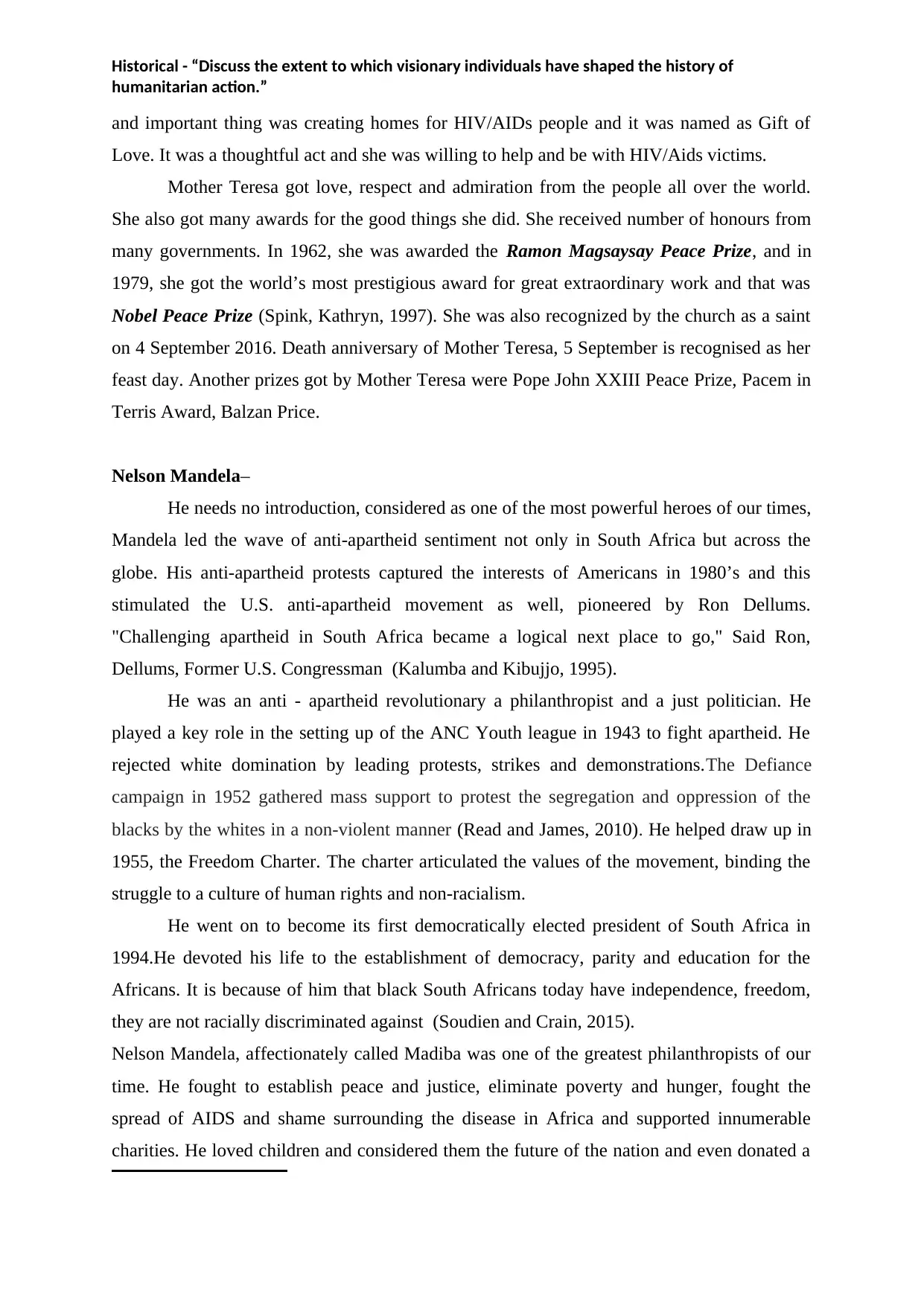
Historical - “Discuss the extent to which visionary individuals have shaped the history of
humanitarian action.”
and important thing was creating homes for HIV/AIDs people and it was named as Gift of
Love. It was a thoughtful act and she was willing to help and be with HIV/Aids victims.
Mother Teresa got love, respect and admiration from the people all over the world.
She also got many awards for the good things she did. She received number of honours from
many governments. In 1962, she was awarded the Ramon Magsaysay Peace Prize, and in
1979, she got the world’s most prestigious award for great extraordinary work and that was
Nobel Peace Prize (Spink, Kathryn, 1997). She was also recognized by the church as a saint
on 4 September 2016. Death anniversary of Mother Teresa, 5 September is recognised as her
feast day. Another prizes got by Mother Teresa were Pope John XXIII Peace Prize, Pacem in
Terris Award, Balzan Price.
Nelson Mandela–
He needs no introduction, considered as one of the most powerful heroes of our times,
Mandela led the wave of anti-apartheid sentiment not only in South Africa but across the
globe. His anti-apartheid protests captured the interests of Americans in 1980’s and this
stimulated the U.S. anti-apartheid movement as well, pioneered by Ron Dellums.
"Challenging apartheid in South Africa became a logical next place to go," Said Ron,
Dellums, Former U.S. Congressman (Kalumba and Kibujjo, 1995).
He was an anti - apartheid revolutionary a philanthropist and a just politician. He
played a key role in the setting up of the ANC Youth league in 1943 to fight apartheid. He
rejected white domination by leading protests, strikes and demonstrations.The Defiance
campaign in 1952 gathered mass support to protest the segregation and oppression of the
blacks by the whites in a non-violent manner (Read and James, 2010). He helped draw up in
1955, the Freedom Charter. The charter articulated the values of the movement, binding the
struggle to a culture of human rights and non-racialism.
He went on to become its first democratically elected president of South Africa in
1994.He devoted his life to the establishment of democracy, parity and education for the
Africans. It is because of him that black South Africans today have independence, freedom,
they are not racially discriminated against (Soudien and Crain, 2015).
Nelson Mandela, affectionately called Madiba was one of the greatest philanthropists of our
time. He fought to establish peace and justice, eliminate poverty and hunger, fought the
spread of AIDS and shame surrounding the disease in Africa and supported innumerable
charities. He loved children and considered them the future of the nation and even donated a
humanitarian action.”
and important thing was creating homes for HIV/AIDs people and it was named as Gift of
Love. It was a thoughtful act and she was willing to help and be with HIV/Aids victims.
Mother Teresa got love, respect and admiration from the people all over the world.
She also got many awards for the good things she did. She received number of honours from
many governments. In 1962, she was awarded the Ramon Magsaysay Peace Prize, and in
1979, she got the world’s most prestigious award for great extraordinary work and that was
Nobel Peace Prize (Spink, Kathryn, 1997). She was also recognized by the church as a saint
on 4 September 2016. Death anniversary of Mother Teresa, 5 September is recognised as her
feast day. Another prizes got by Mother Teresa were Pope John XXIII Peace Prize, Pacem in
Terris Award, Balzan Price.
Nelson Mandela–
He needs no introduction, considered as one of the most powerful heroes of our times,
Mandela led the wave of anti-apartheid sentiment not only in South Africa but across the
globe. His anti-apartheid protests captured the interests of Americans in 1980’s and this
stimulated the U.S. anti-apartheid movement as well, pioneered by Ron Dellums.
"Challenging apartheid in South Africa became a logical next place to go," Said Ron,
Dellums, Former U.S. Congressman (Kalumba and Kibujjo, 1995).
He was an anti - apartheid revolutionary a philanthropist and a just politician. He
played a key role in the setting up of the ANC Youth league in 1943 to fight apartheid. He
rejected white domination by leading protests, strikes and demonstrations.The Defiance
campaign in 1952 gathered mass support to protest the segregation and oppression of the
blacks by the whites in a non-violent manner (Read and James, 2010). He helped draw up in
1955, the Freedom Charter. The charter articulated the values of the movement, binding the
struggle to a culture of human rights and non-racialism.
He went on to become its first democratically elected president of South Africa in
1994.He devoted his life to the establishment of democracy, parity and education for the
Africans. It is because of him that black South Africans today have independence, freedom,
they are not racially discriminated against (Soudien and Crain, 2015).
Nelson Mandela, affectionately called Madiba was one of the greatest philanthropists of our
time. He fought to establish peace and justice, eliminate poverty and hunger, fought the
spread of AIDS and shame surrounding the disease in Africa and supported innumerable
charities. He loved children and considered them the future of the nation and even donated a
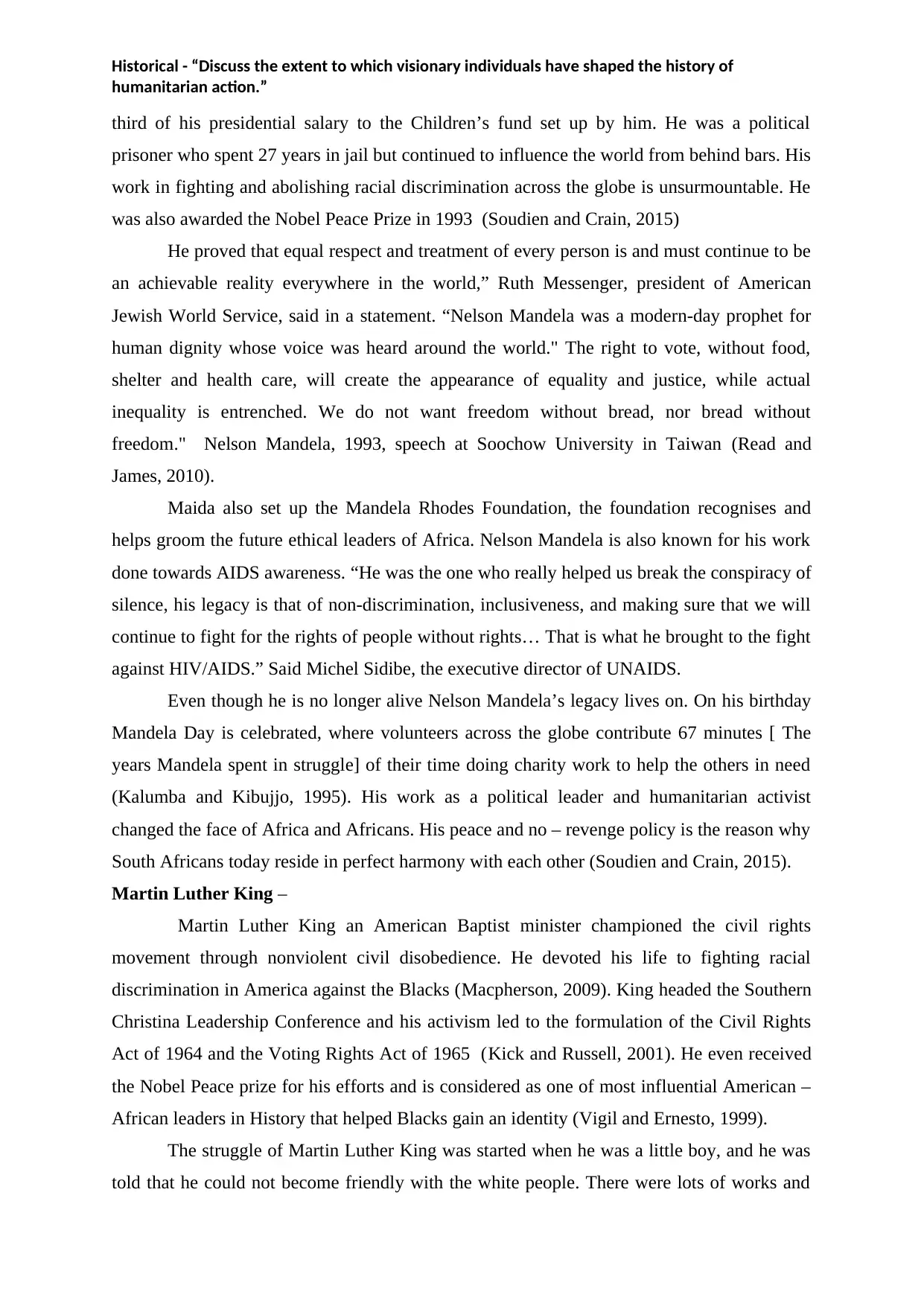
Historical - “Discuss the extent to which visionary individuals have shaped the history of
humanitarian action.”
third of his presidential salary to the Children’s fund set up by him. He was a political
prisoner who spent 27 years in jail but continued to influence the world from behind bars. His
work in fighting and abolishing racial discrimination across the globe is unsurmountable. He
was also awarded the Nobel Peace Prize in 1993 (Soudien and Crain, 2015)
He proved that equal respect and treatment of every person is and must continue to be
an achievable reality everywhere in the world,” Ruth Messenger, president of American
Jewish World Service, said in a statement. “Nelson Mandela was a modern-day prophet for
human dignity whose voice was heard around the world." The right to vote, without food,
shelter and health care, will create the appearance of equality and justice, while actual
inequality is entrenched. We do not want freedom without bread, nor bread without
freedom." Nelson Mandela, 1993, speech at Soochow University in Taiwan (Read and
James, 2010).
Maida also set up the Mandela Rhodes Foundation, the foundation recognises and
helps groom the future ethical leaders of Africa. Nelson Mandela is also known for his work
done towards AIDS awareness. “He was the one who really helped us break the conspiracy of
silence, his legacy is that of non-discrimination, inclusiveness, and making sure that we will
continue to fight for the rights of people without rights… That is what he brought to the fight
against HIV/AIDS.” Said Michel Sidibe, the executive director of UNAIDS.
Even though he is no longer alive Nelson Mandela’s legacy lives on. On his birthday
Mandela Day is celebrated, where volunteers across the globe contribute 67 minutes [ The
years Mandela spent in struggle] of their time doing charity work to help the others in need
(Kalumba and Kibujjo, 1995). His work as a political leader and humanitarian activist
changed the face of Africa and Africans. His peace and no – revenge policy is the reason why
South Africans today reside in perfect harmony with each other (Soudien and Crain, 2015).
Martin Luther King –
Martin Luther King an American Baptist minister championed the civil rights
movement through nonviolent civil disobedience. He devoted his life to fighting racial
discrimination in America against the Blacks (Macpherson, 2009). King headed the Southern
Christina Leadership Conference and his activism led to the formulation of the Civil Rights
Act of 1964 and the Voting Rights Act of 1965 (Kick and Russell, 2001). He even received
the Nobel Peace prize for his efforts and is considered as one of most influential American –
African leaders in History that helped Blacks gain an identity (Vigil and Ernesto, 1999).
The struggle of Martin Luther King was started when he was a little boy, and he was
told that he could not become friendly with the white people. There were lots of works and
humanitarian action.”
third of his presidential salary to the Children’s fund set up by him. He was a political
prisoner who spent 27 years in jail but continued to influence the world from behind bars. His
work in fighting and abolishing racial discrimination across the globe is unsurmountable. He
was also awarded the Nobel Peace Prize in 1993 (Soudien and Crain, 2015)
He proved that equal respect and treatment of every person is and must continue to be
an achievable reality everywhere in the world,” Ruth Messenger, president of American
Jewish World Service, said in a statement. “Nelson Mandela was a modern-day prophet for
human dignity whose voice was heard around the world." The right to vote, without food,
shelter and health care, will create the appearance of equality and justice, while actual
inequality is entrenched. We do not want freedom without bread, nor bread without
freedom." Nelson Mandela, 1993, speech at Soochow University in Taiwan (Read and
James, 2010).
Maida also set up the Mandela Rhodes Foundation, the foundation recognises and
helps groom the future ethical leaders of Africa. Nelson Mandela is also known for his work
done towards AIDS awareness. “He was the one who really helped us break the conspiracy of
silence, his legacy is that of non-discrimination, inclusiveness, and making sure that we will
continue to fight for the rights of people without rights… That is what he brought to the fight
against HIV/AIDS.” Said Michel Sidibe, the executive director of UNAIDS.
Even though he is no longer alive Nelson Mandela’s legacy lives on. On his birthday
Mandela Day is celebrated, where volunteers across the globe contribute 67 minutes [ The
years Mandela spent in struggle] of their time doing charity work to help the others in need
(Kalumba and Kibujjo, 1995). His work as a political leader and humanitarian activist
changed the face of Africa and Africans. His peace and no – revenge policy is the reason why
South Africans today reside in perfect harmony with each other (Soudien and Crain, 2015).
Martin Luther King –
Martin Luther King an American Baptist minister championed the civil rights
movement through nonviolent civil disobedience. He devoted his life to fighting racial
discrimination in America against the Blacks (Macpherson, 2009). King headed the Southern
Christina Leadership Conference and his activism led to the formulation of the Civil Rights
Act of 1964 and the Voting Rights Act of 1965 (Kick and Russell, 2001). He even received
the Nobel Peace prize for his efforts and is considered as one of most influential American –
African leaders in History that helped Blacks gain an identity (Vigil and Ernesto, 1999).
The struggle of Martin Luther King was started when he was a little boy, and he was
told that he could not become friendly with the white people. There were lots of works and
⊘ This is a preview!⊘
Do you want full access?
Subscribe today to unlock all pages.

Trusted by 1+ million students worldwide
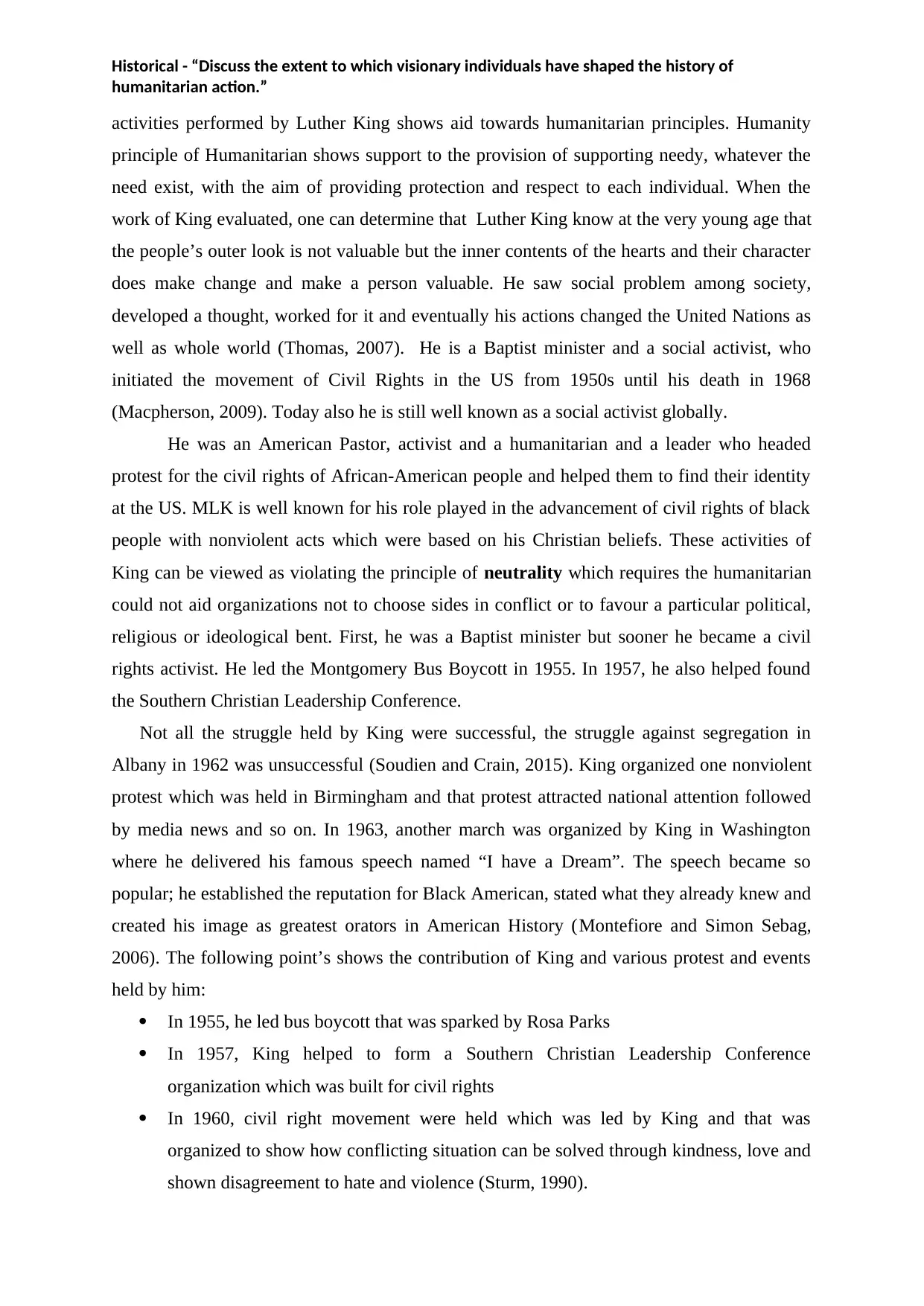
Historical - “Discuss the extent to which visionary individuals have shaped the history of
humanitarian action.”
activities performed by Luther King shows aid towards humanitarian principles. Humanity
principle of Humanitarian shows support to the provision of supporting needy, whatever the
need exist, with the aim of providing protection and respect to each individual. When the
work of King evaluated, one can determine that Luther King know at the very young age that
the people’s outer look is not valuable but the inner contents of the hearts and their character
does make change and make a person valuable. He saw social problem among society,
developed a thought, worked for it and eventually his actions changed the United Nations as
well as whole world (Thomas, 2007). He is a Baptist minister and a social activist, who
initiated the movement of Civil Rights in the US from 1950s until his death in 1968
(Macpherson, 2009). Today also he is still well known as a social activist globally.
He was an American Pastor, activist and a humanitarian and a leader who headed
protest for the civil rights of African-American people and helped them to find their identity
at the US. MLK is well known for his role played in the advancement of civil rights of black
people with nonviolent acts which were based on his Christian beliefs. These activities of
King can be viewed as violating the principle of neutrality which requires the humanitarian
could not aid organizations not to choose sides in conflict or to favour a particular political,
religious or ideological bent. First, he was a Baptist minister but sooner he became a civil
rights activist. He led the Montgomery Bus Boycott in 1955. In 1957, he also helped found
the Southern Christian Leadership Conference.
Not all the struggle held by King were successful, the struggle against segregation in
Albany in 1962 was unsuccessful (Soudien and Crain, 2015). King organized one nonviolent
protest which was held in Birmingham and that protest attracted national attention followed
by media news and so on. In 1963, another march was organized by King in Washington
where he delivered his famous speech named “I have a Dream”. The speech became so
popular; he established the reputation for Black American, stated what they already knew and
created his image as greatest orators in American History (Montefiore and Simon Sebag,
2006). The following point’s shows the contribution of King and various protest and events
held by him:
In 1955, he led bus boycott that was sparked by Rosa Parks
In 1957, King helped to form a Southern Christian Leadership Conference
organization which was built for civil rights
In 1960, civil right movement were held which was led by King and that was
organized to show how conflicting situation can be solved through kindness, love and
shown disagreement to hate and violence (Sturm, 1990).
humanitarian action.”
activities performed by Luther King shows aid towards humanitarian principles. Humanity
principle of Humanitarian shows support to the provision of supporting needy, whatever the
need exist, with the aim of providing protection and respect to each individual. When the
work of King evaluated, one can determine that Luther King know at the very young age that
the people’s outer look is not valuable but the inner contents of the hearts and their character
does make change and make a person valuable. He saw social problem among society,
developed a thought, worked for it and eventually his actions changed the United Nations as
well as whole world (Thomas, 2007). He is a Baptist minister and a social activist, who
initiated the movement of Civil Rights in the US from 1950s until his death in 1968
(Macpherson, 2009). Today also he is still well known as a social activist globally.
He was an American Pastor, activist and a humanitarian and a leader who headed
protest for the civil rights of African-American people and helped them to find their identity
at the US. MLK is well known for his role played in the advancement of civil rights of black
people with nonviolent acts which were based on his Christian beliefs. These activities of
King can be viewed as violating the principle of neutrality which requires the humanitarian
could not aid organizations not to choose sides in conflict or to favour a particular political,
religious or ideological bent. First, he was a Baptist minister but sooner he became a civil
rights activist. He led the Montgomery Bus Boycott in 1955. In 1957, he also helped found
the Southern Christian Leadership Conference.
Not all the struggle held by King were successful, the struggle against segregation in
Albany in 1962 was unsuccessful (Soudien and Crain, 2015). King organized one nonviolent
protest which was held in Birmingham and that protest attracted national attention followed
by media news and so on. In 1963, another march was organized by King in Washington
where he delivered his famous speech named “I have a Dream”. The speech became so
popular; he established the reputation for Black American, stated what they already knew and
created his image as greatest orators in American History (Montefiore and Simon Sebag,
2006). The following point’s shows the contribution of King and various protest and events
held by him:
In 1955, he led bus boycott that was sparked by Rosa Parks
In 1957, King helped to form a Southern Christian Leadership Conference
organization which was built for civil rights
In 1960, civil right movement were held which was led by King and that was
organized to show how conflicting situation can be solved through kindness, love and
shown disagreement to hate and violence (Sturm, 1990).
Paraphrase This Document
Need a fresh take? Get an instant paraphrase of this document with our AI Paraphraser
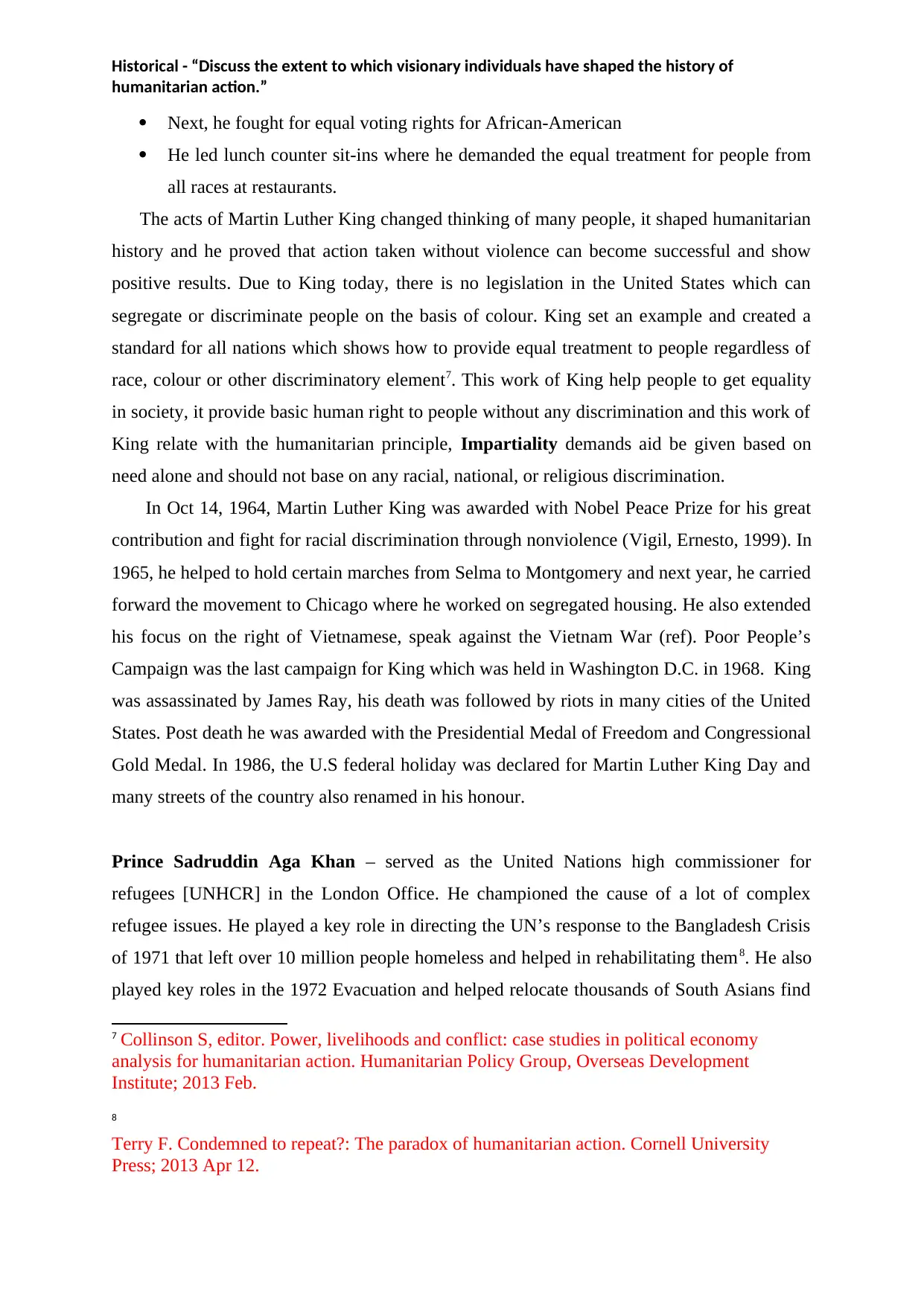
Historical - “Discuss the extent to which visionary individuals have shaped the history of
humanitarian action.”
Next, he fought for equal voting rights for African-American
He led lunch counter sit-ins where he demanded the equal treatment for people from
all races at restaurants.
The acts of Martin Luther King changed thinking of many people, it shaped humanitarian
history and he proved that action taken without violence can become successful and show
positive results. Due to King today, there is no legislation in the United States which can
segregate or discriminate people on the basis of colour. King set an example and created a
standard for all nations which shows how to provide equal treatment to people regardless of
race, colour or other discriminatory element7. This work of King help people to get equality
in society, it provide basic human right to people without any discrimination and this work of
King relate with the humanitarian principle, Impartiality demands aid be given based on
need alone and should not base on any racial, national, or religious discrimination.
In Oct 14, 1964, Martin Luther King was awarded with Nobel Peace Prize for his great
contribution and fight for racial discrimination through nonviolence (Vigil, Ernesto, 1999). In
1965, he helped to hold certain marches from Selma to Montgomery and next year, he carried
forward the movement to Chicago where he worked on segregated housing. He also extended
his focus on the right of Vietnamese, speak against the Vietnam War (ref). Poor People’s
Campaign was the last campaign for King which was held in Washington D.C. in 1968. King
was assassinated by James Ray, his death was followed by riots in many cities of the United
States. Post death he was awarded with the Presidential Medal of Freedom and Congressional
Gold Medal. In 1986, the U.S federal holiday was declared for Martin Luther King Day and
many streets of the country also renamed in his honour.
Prince Sadruddin Aga Khan – served as the United Nations high commissioner for
refugees [UNHCR] in the London Office. He championed the cause of a lot of complex
refugee issues. He played a key role in directing the UN’s response to the Bangladesh Crisis
of 1971 that left over 10 million people homeless and helped in rehabilitating them8. He also
played key roles in the 1972 Evacuation and helped relocate thousands of South Asians find
7 Collinson S, editor. Power, livelihoods and conflict: case studies in political economy
analysis for humanitarian action. Humanitarian Policy Group, Overseas Development
Institute; 2013 Feb.
8
Terry F. Condemned to repeat?: The paradox of humanitarian action. Cornell University
Press; 2013 Apr 12.
humanitarian action.”
Next, he fought for equal voting rights for African-American
He led lunch counter sit-ins where he demanded the equal treatment for people from
all races at restaurants.
The acts of Martin Luther King changed thinking of many people, it shaped humanitarian
history and he proved that action taken without violence can become successful and show
positive results. Due to King today, there is no legislation in the United States which can
segregate or discriminate people on the basis of colour. King set an example and created a
standard for all nations which shows how to provide equal treatment to people regardless of
race, colour or other discriminatory element7. This work of King help people to get equality
in society, it provide basic human right to people without any discrimination and this work of
King relate with the humanitarian principle, Impartiality demands aid be given based on
need alone and should not base on any racial, national, or religious discrimination.
In Oct 14, 1964, Martin Luther King was awarded with Nobel Peace Prize for his great
contribution and fight for racial discrimination through nonviolence (Vigil, Ernesto, 1999). In
1965, he helped to hold certain marches from Selma to Montgomery and next year, he carried
forward the movement to Chicago where he worked on segregated housing. He also extended
his focus on the right of Vietnamese, speak against the Vietnam War (ref). Poor People’s
Campaign was the last campaign for King which was held in Washington D.C. in 1968. King
was assassinated by James Ray, his death was followed by riots in many cities of the United
States. Post death he was awarded with the Presidential Medal of Freedom and Congressional
Gold Medal. In 1986, the U.S federal holiday was declared for Martin Luther King Day and
many streets of the country also renamed in his honour.
Prince Sadruddin Aga Khan – served as the United Nations high commissioner for
refugees [UNHCR] in the London Office. He championed the cause of a lot of complex
refugee issues. He played a key role in directing the UN’s response to the Bangladesh Crisis
of 1971 that left over 10 million people homeless and helped in rehabilitating them8. He also
played key roles in the 1972 Evacuation and helped relocate thousands of South Asians find
7 Collinson S, editor. Power, livelihoods and conflict: case studies in political economy
analysis for humanitarian action. Humanitarian Policy Group, Overseas Development
Institute; 2013 Feb.
8
Terry F. Condemned to repeat?: The paradox of humanitarian action. Cornell University
Press; 2013 Apr 12.
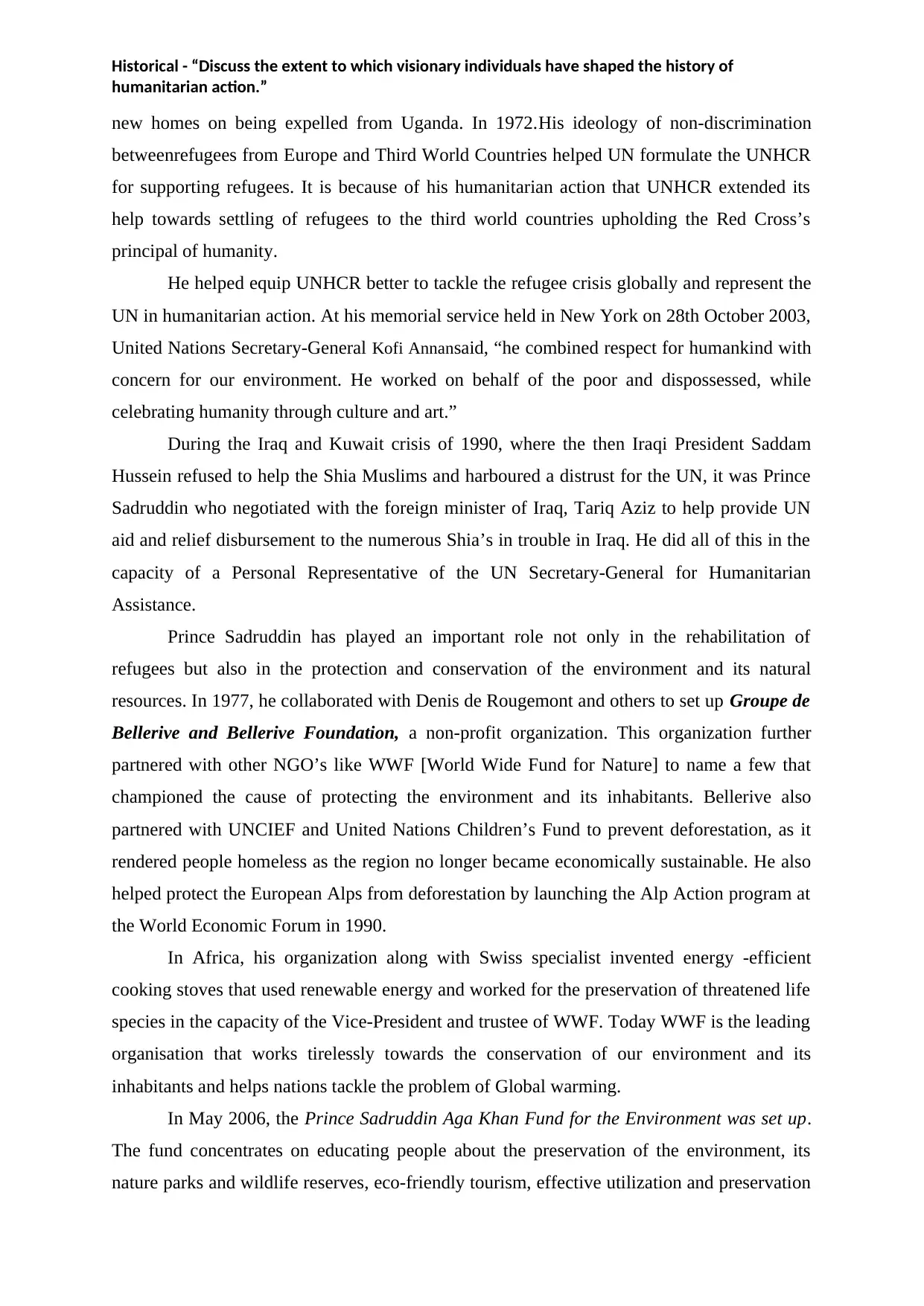
Historical - “Discuss the extent to which visionary individuals have shaped the history of
humanitarian action.”
new homes on being expelled from Uganda. In 1972.His ideology of non-discrimination
betweenrefugees from Europe and Third World Countries helped UN formulate the UNHCR
for supporting refugees. It is because of his humanitarian action that UNHCR extended its
help towards settling of refugees to the third world countries upholding the Red Cross’s
principal of humanity.
He helped equip UNHCR better to tackle the refugee crisis globally and represent the
UN in humanitarian action. At his memorial service held in New York on 28th October 2003,
United Nations Secretary-General Kofi Annansaid, “he combined respect for humankind with
concern for our environment. He worked on behalf of the poor and dispossessed, while
celebrating humanity through culture and art.”
During the Iraq and Kuwait crisis of 1990, where the then Iraqi President Saddam
Hussein refused to help the Shia Muslims and harboured a distrust for the UN, it was Prince
Sadruddin who negotiated with the foreign minister of Iraq, Tariq Aziz to help provide UN
aid and relief disbursement to the numerous Shia’s in trouble in Iraq. He did all of this in the
capacity of a Personal Representative of the UN Secretary-General for Humanitarian
Assistance.
Prince Sadruddin has played an important role not only in the rehabilitation of
refugees but also in the protection and conservation of the environment and its natural
resources. In 1977, he collaborated with Denis de Rougemont and others to set up Groupe de
Bellerive and Bellerive Foundation, a non-profit organization. This organization further
partnered with other NGO’s like WWF [World Wide Fund for Nature] to name a few that
championed the cause of protecting the environment and its inhabitants. Bellerive also
partnered with UNCIEF and United Nations Children’s Fund to prevent deforestation, as it
rendered people homeless as the region no longer became economically sustainable. He also
helped protect the European Alps from deforestation by launching the Alp Action program at
the World Economic Forum in 1990.
In Africa, his organization along with Swiss specialist invented energy -efficient
cooking stoves that used renewable energy and worked for the preservation of threatened life
species in the capacity of the Vice-President and trustee of WWF. Today WWF is the leading
organisation that works tirelessly towards the conservation of our environment and its
inhabitants and helps nations tackle the problem of Global warming.
In May 2006, the Prince Sadruddin Aga Khan Fund for the Environment was set up.
The fund concentrates on educating people about the preservation of the environment, its
nature parks and wildlife reserves, eco-friendly tourism, effective utilization and preservation
humanitarian action.”
new homes on being expelled from Uganda. In 1972.His ideology of non-discrimination
betweenrefugees from Europe and Third World Countries helped UN formulate the UNHCR
for supporting refugees. It is because of his humanitarian action that UNHCR extended its
help towards settling of refugees to the third world countries upholding the Red Cross’s
principal of humanity.
He helped equip UNHCR better to tackle the refugee crisis globally and represent the
UN in humanitarian action. At his memorial service held in New York on 28th October 2003,
United Nations Secretary-General Kofi Annansaid, “he combined respect for humankind with
concern for our environment. He worked on behalf of the poor and dispossessed, while
celebrating humanity through culture and art.”
During the Iraq and Kuwait crisis of 1990, where the then Iraqi President Saddam
Hussein refused to help the Shia Muslims and harboured a distrust for the UN, it was Prince
Sadruddin who negotiated with the foreign minister of Iraq, Tariq Aziz to help provide UN
aid and relief disbursement to the numerous Shia’s in trouble in Iraq. He did all of this in the
capacity of a Personal Representative of the UN Secretary-General for Humanitarian
Assistance.
Prince Sadruddin has played an important role not only in the rehabilitation of
refugees but also in the protection and conservation of the environment and its natural
resources. In 1977, he collaborated with Denis de Rougemont and others to set up Groupe de
Bellerive and Bellerive Foundation, a non-profit organization. This organization further
partnered with other NGO’s like WWF [World Wide Fund for Nature] to name a few that
championed the cause of protecting the environment and its inhabitants. Bellerive also
partnered with UNCIEF and United Nations Children’s Fund to prevent deforestation, as it
rendered people homeless as the region no longer became economically sustainable. He also
helped protect the European Alps from deforestation by launching the Alp Action program at
the World Economic Forum in 1990.
In Africa, his organization along with Swiss specialist invented energy -efficient
cooking stoves that used renewable energy and worked for the preservation of threatened life
species in the capacity of the Vice-President and trustee of WWF. Today WWF is the leading
organisation that works tirelessly towards the conservation of our environment and its
inhabitants and helps nations tackle the problem of Global warming.
In May 2006, the Prince Sadruddin Aga Khan Fund for the Environment was set up.
The fund concentrates on educating people about the preservation of the environment, its
nature parks and wildlife reserves, eco-friendly tourism, effective utilization and preservation
⊘ This is a preview!⊘
Do you want full access?
Subscribe today to unlock all pages.

Trusted by 1+ million students worldwide
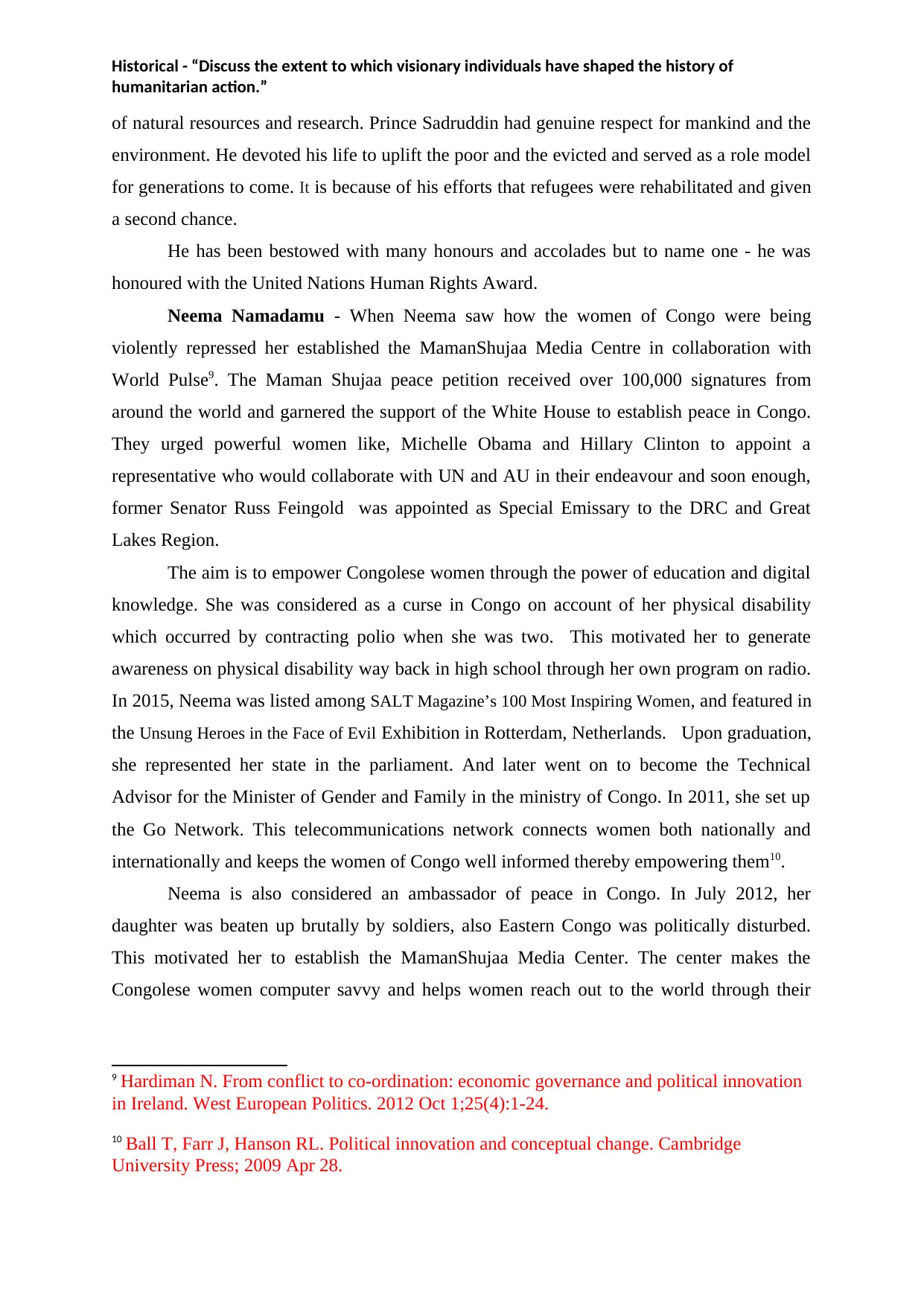
Historical - “Discuss the extent to which visionary individuals have shaped the history of
humanitarian action.”
of natural resources and research. Prince Sadruddin had genuine respect for mankind and the
environment. He devoted his life to uplift the poor and the evicted and served as a role model
for generations to come. It is because of his efforts that refugees were rehabilitated and given
a second chance.
He has been bestowed with many honours and accolades but to name one - he was
honoured with the United Nations Human Rights Award.
Neema Namadamu - When Neema saw how the women of Congo were being
violently repressed her established the MamanShujaa Media Centre in collaboration with
World Pulse9. The Maman Shujaa peace petition received over 100,000 signatures from
around the world and garnered the support of the White House to establish peace in Congo.
They urged powerful women like, Michelle Obama and Hillary Clinton to appoint a
representative who would collaborate with UN and AU in their endeavour and soon enough,
former Senator Russ Feingold was appointed as Special Emissary to the DRC and Great
Lakes Region.
The aim is to empower Congolese women through the power of education and digital
knowledge. She was considered as a curse in Congo on account of her physical disability
which occurred by contracting polio when she was two. This motivated her to generate
awareness on physical disability way back in high school through her own program on radio.
In 2015, Neema was listed among SALT Magazine’s 100 Most Inspiring Women, and featured in
the Unsung Heroes in the Face of Evil Exhibition in Rotterdam, Netherlands. Upon graduation,
she represented her state in the parliament. And later went on to become the Technical
Advisor for the Minister of Gender and Family in the ministry of Congo. In 2011, she set up
the Go Network. This telecommunications network connects women both nationally and
internationally and keeps the women of Congo well informed thereby empowering them10.
Neema is also considered an ambassador of peace in Congo. In July 2012, her
daughter was beaten up brutally by soldiers, also Eastern Congo was politically disturbed.
This motivated her to establish the MamanShujaa Media Center. The center makes the
Congolese women computer savvy and helps women reach out to the world through their
9 Hardiman N. From conflict to co-ordination: economic governance and political innovation
in Ireland. West European Politics. 2012 Oct 1;25(4):1-24.
10 Ball T, Farr J, Hanson RL. Political innovation and conceptual change. Cambridge
University Press; 2009 Apr 28.
humanitarian action.”
of natural resources and research. Prince Sadruddin had genuine respect for mankind and the
environment. He devoted his life to uplift the poor and the evicted and served as a role model
for generations to come. It is because of his efforts that refugees were rehabilitated and given
a second chance.
He has been bestowed with many honours and accolades but to name one - he was
honoured with the United Nations Human Rights Award.
Neema Namadamu - When Neema saw how the women of Congo were being
violently repressed her established the MamanShujaa Media Centre in collaboration with
World Pulse9. The Maman Shujaa peace petition received over 100,000 signatures from
around the world and garnered the support of the White House to establish peace in Congo.
They urged powerful women like, Michelle Obama and Hillary Clinton to appoint a
representative who would collaborate with UN and AU in their endeavour and soon enough,
former Senator Russ Feingold was appointed as Special Emissary to the DRC and Great
Lakes Region.
The aim is to empower Congolese women through the power of education and digital
knowledge. She was considered as a curse in Congo on account of her physical disability
which occurred by contracting polio when she was two. This motivated her to generate
awareness on physical disability way back in high school through her own program on radio.
In 2015, Neema was listed among SALT Magazine’s 100 Most Inspiring Women, and featured in
the Unsung Heroes in the Face of Evil Exhibition in Rotterdam, Netherlands. Upon graduation,
she represented her state in the parliament. And later went on to become the Technical
Advisor for the Minister of Gender and Family in the ministry of Congo. In 2011, she set up
the Go Network. This telecommunications network connects women both nationally and
internationally and keeps the women of Congo well informed thereby empowering them10.
Neema is also considered an ambassador of peace in Congo. In July 2012, her
daughter was beaten up brutally by soldiers, also Eastern Congo was politically disturbed.
This motivated her to establish the MamanShujaa Media Center. The center makes the
Congolese women computer savvy and helps women reach out to the world through their
9 Hardiman N. From conflict to co-ordination: economic governance and political innovation
in Ireland. West European Politics. 2012 Oct 1;25(4):1-24.
10 Ball T, Farr J, Hanson RL. Political innovation and conceptual change. Cambridge
University Press; 2009 Apr 28.
Paraphrase This Document
Need a fresh take? Get an instant paraphrase of this document with our AI Paraphraser
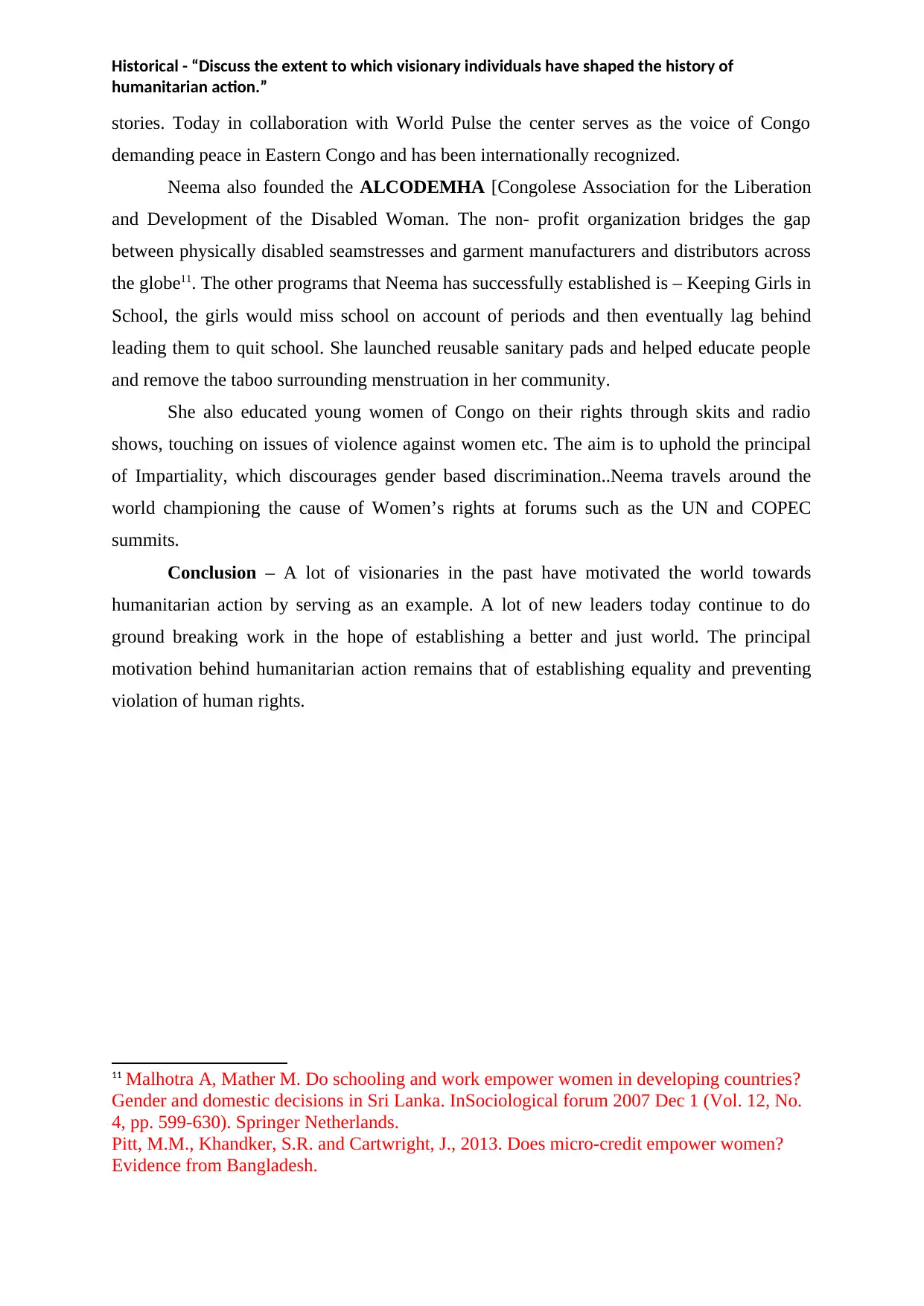
Historical - “Discuss the extent to which visionary individuals have shaped the history of
humanitarian action.”
stories. Today in collaboration with World Pulse the center serves as the voice of Congo
demanding peace in Eastern Congo and has been internationally recognized.
Neema also founded the ALCODEMHA [Congolese Association for the Liberation
and Development of the Disabled Woman. The non- profit organization bridges the gap
between physically disabled seamstresses and garment manufacturers and distributors across
the globe11. The other programs that Neema has successfully established is – Keeping Girls in
School, the girls would miss school on account of periods and then eventually lag behind
leading them to quit school. She launched reusable sanitary pads and helped educate people
and remove the taboo surrounding menstruation in her community.
She also educated young women of Congo on their rights through skits and radio
shows, touching on issues of violence against women etc. The aim is to uphold the principal
of Impartiality, which discourages gender based discrimination..Neema travels around the
world championing the cause of Women’s rights at forums such as the UN and COPEC
summits.
Conclusion – A lot of visionaries in the past have motivated the world towards
humanitarian action by serving as an example. A lot of new leaders today continue to do
ground breaking work in the hope of establishing a better and just world. The principal
motivation behind humanitarian action remains that of establishing equality and preventing
violation of human rights.
11 Malhotra A, Mather M. Do schooling and work empower women in developing countries?
Gender and domestic decisions in Sri Lanka. InSociological forum 2007 Dec 1 (Vol. 12, No.
4, pp. 599-630). Springer Netherlands.
Pitt, M.M., Khandker, S.R. and Cartwright, J., 2013. Does micro-credit empower women?
Evidence from Bangladesh.
humanitarian action.”
stories. Today in collaboration with World Pulse the center serves as the voice of Congo
demanding peace in Eastern Congo and has been internationally recognized.
Neema also founded the ALCODEMHA [Congolese Association for the Liberation
and Development of the Disabled Woman. The non- profit organization bridges the gap
between physically disabled seamstresses and garment manufacturers and distributors across
the globe11. The other programs that Neema has successfully established is – Keeping Girls in
School, the girls would miss school on account of periods and then eventually lag behind
leading them to quit school. She launched reusable sanitary pads and helped educate people
and remove the taboo surrounding menstruation in her community.
She also educated young women of Congo on their rights through skits and radio
shows, touching on issues of violence against women etc. The aim is to uphold the principal
of Impartiality, which discourages gender based discrimination..Neema travels around the
world championing the cause of Women’s rights at forums such as the UN and COPEC
summits.
Conclusion – A lot of visionaries in the past have motivated the world towards
humanitarian action by serving as an example. A lot of new leaders today continue to do
ground breaking work in the hope of establishing a better and just world. The principal
motivation behind humanitarian action remains that of establishing equality and preventing
violation of human rights.
11 Malhotra A, Mather M. Do schooling and work empower women in developing countries?
Gender and domestic decisions in Sri Lanka. InSociological forum 2007 Dec 1 (Vol. 12, No.
4, pp. 599-630). Springer Netherlands.
Pitt, M.M., Khandker, S.R. and Cartwright, J., 2013. Does micro-credit empower women?
Evidence from Bangladesh.

Historical - “Discuss the extent to which visionary individuals have shaped the history of
humanitarian action.”
humanitarian action.”
⊘ This is a preview!⊘
Do you want full access?
Subscribe today to unlock all pages.

Trusted by 1+ million students worldwide
1 out of 13
Your All-in-One AI-Powered Toolkit for Academic Success.
+13062052269
info@desklib.com
Available 24*7 on WhatsApp / Email
![[object Object]](/_next/static/media/star-bottom.7253800d.svg)
Unlock your academic potential
Copyright © 2020–2026 A2Z Services. All Rights Reserved. Developed and managed by ZUCOL.